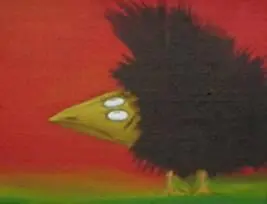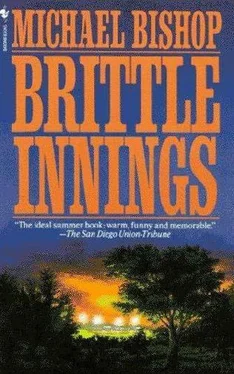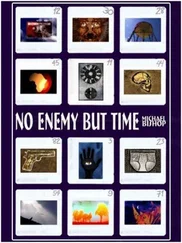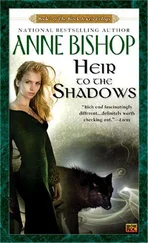I got out Mama’s Brownie and took a picture.
As evening drew on, Henry and I walked back to the hut where we’d spent the night. The ache in my knee had let up some, and my limp seemed less pronounced. I asked Henry what he’d done with his old man. He didn’t answer.
“Come on, Henry. You didn’t leave him in ’Bama, did you?”
He shook his head, still striding, still thoughtful.
“Then what? What’d you do?”
“He lies among a host of ancient Aleut mummies, fur- and grass-wrapped carcasses in a cave on one of the Islands of Four Mountains southwest of Umnak. I never intend anyone to move him again. His traveling days are over. There he will rest until the generative vulcanism of this archipelago drowns its islands, Daniel, or until the world expires in either fire or ice. I am resigned.”
Henry refused to fly back to Kodiak with Fego and me aboard Fego’s battered prop plane. He said he’d eventually return for a look-see to Oongpek, on Alaska’s Seward Peninsula, but in the meantime wanted solitude and a chance to sort through his options. He gave Fego a small stack of U. S. bills of various denominations, for flying us to Attu and for returning me to Kodiak to pick up a commercial flight to Anchorage. Then he hugged me and stood clear as Fego and I taxied for takeoff, under a streaky sky, in a moderate crosswind.
“Whachu thinka that Henry fella?” Fego asked me when were up and rippling over the ashy chop of the Bering Sea.
His question startled me because he didn’t talk all that much. I said, “Why do you ask?”
“Sumfin funny bout him. Not joos how beeg he is- sumfin else. Lak mebbe summa his feelins been cut loose. Lak beeg as he is, you know, sum parta him’s missin.”
“Which part?”
“Dunno. Soul mebbe. The spirit part,”
“How long’ve you known Henry, Fego?”
“Hey, I don’t know him. Joos met him lass winter. I work for him sumtimes since, thass it.”
“Oh.”
“He tol me you roomed with him. Gude. Cause I lak to know the pipple I fly bettern I know this beeg ol Henry guy.”
“Oh.”
“So whatchu thinka him?”
“I think he’s working hard on his soul,” I said. “I think he’s becoming a real person.”
Danny Boles, a long-time scout for the Philadelphia Phillies who began working for the Atlanta Braves in 1978, died on opening day of the 1991 baseball season. He was 66. In the early 1980s, he had his vocal cords removed to halt the advance of a throat cancer whose recurrence in 1989 led to his death.
Always a famous raconteur. Boles learned to talk with the aid of a microphone-like amplifier that he held to his throat. The amplifier gave him a mechanical-sounding “robot” voice that he was still able to infuse with personality. To obtain the material assembled in his memoir Brittle Innings , I conducted nearly forty interviews with Mr Boles. They ranged in length from twenty minutes to nearly three hours. He also gave me access to his longhand transcriptions of the journals of “Henry Clerval.” From these sources, I distilled the remarkable text now in your hands.
Look next year for my sports biography The Good Scout , in which I chronicle Mr Boles’s career as one of the most able major league scouts in post-war America. It will not stretch your credulity quite so far as Brittle Innings has likely done, and I immodestly regard it as the best book on this topic since Mark Winegardner’s Prophet of the Sandlots .
– GABRIEL STEWART
Columbus, Georgia
August 21, 1992
In addition to my family, I must thank these people: Howard Morhaim, my indefatigable agent; Lou Aronica, an editor and publisher who likes baseball as much as I do; Jennifer Hershey, who edited the ms. with intelligence and care; Eddie Hall, who sent me a little book about baseball in the nineteenth century; Diane Hughes, who told me about her hemophiliac father; Joel Gotler, who saw the film possibilities in this material; John Kostmayer, who did a screenplay based on an early novella-length version of this story; Mark Winegardner, author of Prophet of the Sandlots , a masterpiece of sports writing; and, of course, Mary Wollstonecraft Shelley and the makers of Universal Pictures’ Frankenstein films of the 1930s.
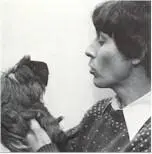
Michael Bishop is the author of the Nebula Award – winning novel No Enemy But Time , the Mythopoeic Fantasy Award-winning novel Unicorn Mountain , and several other novels and short-story collections. He also writes poetry and criticism, and has edited the acclaimed anthology Light Years and Dark and three volumes of the annual Nebula Awards collections. Michael Bishop lives in Pine Mountain, Georgia, with his wife, Jeri, and their two college-aged children. He followed the Atlanta Braves even when they were losing.
***
